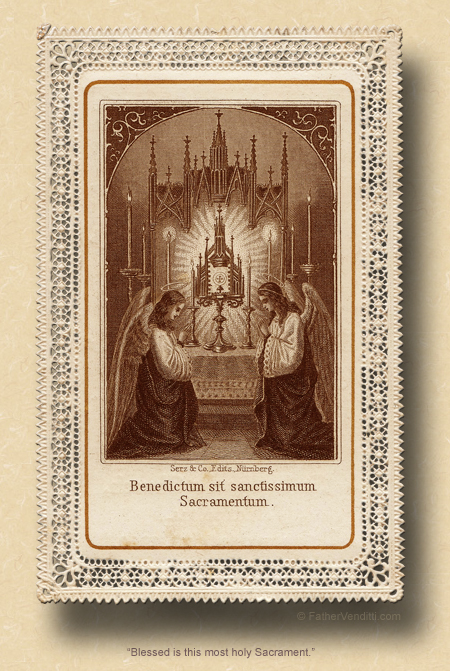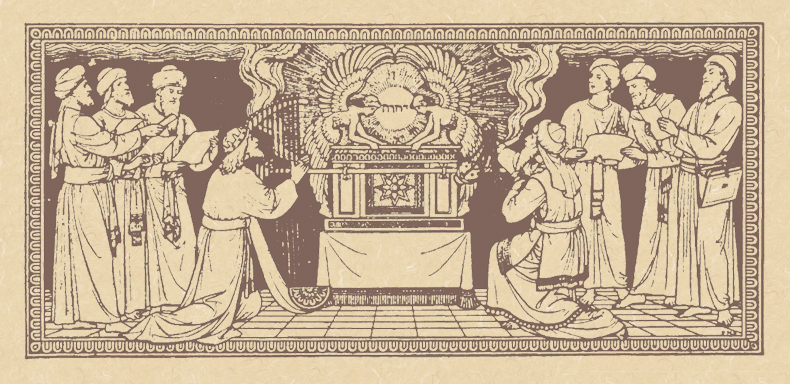Life Is (Not) Like a Box of Chocolates.
The Twenty-Fifth Saturday of Ordinary Time; or, the Memorial of Saints Cosmas & Damian, Martyrs.
Lessons from the primary feria, according to the ordinary form of the Roman Rite:
• Zechariah 2: 5-9, 14-15.
• Jeremiah 31: 10-13 (in place of the psalm).
• Luke 9: 43-45.
The Ember Saturday of September;* the Commemoration of Saints Isaac Jogues, John de Brébeuf & their Companions, Martyrs (in the US & Canada); and, the Commemoration of Saints Cyprian, Martyr, & Justina, Virgin & Martyr.
Lessons from the feria, according to the extraordinary form of the Roman Rite:
• Leviticus 23: 26-31.
• Hebrews 9: 2-12.
• Psalm 116: 1-2.
• Luke 13: 6-17.
• Leviticus 23: 39-43.
• Psalm 83: 10, 9.
• Micah 7: 14, 16, 18-20.
• Psalm 89: 31, 1.
• Zechariah 8: 14-19.
• Psalm 140: 2.
• Daniel 3: 47-56.
The Seventeenth Saturday after Pentecost; and, the Feast of the Falling Asleep of the Holy Apostle & Evangelist, John the Theologian.
First & third lessons from the pentecostarion, second and fourth from the menaion, according to the Ruthenian recension of the Byzantine Rite:
• I Corinthians 15: 15: 29-45.
• I John 4: 12-19.
• Luke 4: 31-26.
• John 19: 25-27; 21: 24-25.
FatherVenditti.com
|
 1:52 PM 9/26/2015 — The first lesson for Holy Mass on the last two days have been, as you know, from the Prophet Haggai, and today's from the Prophet Zechariah. Both are concerned with the same subject, so let's review. 1:52 PM 9/26/2015 — The first lesson for Holy Mass on the last two days have been, as you know, from the Prophet Haggai, and today's from the Prophet Zechariah. Both are concerned with the same subject, so let's review.
The Jewish people have just been released from their captivity in Babylon and, returning to Jerusalem, they find their Temple in ruins. Haggai makes an impassioned plea to the people to rebuild the Temple, which they agree to do; Zechariah and some other guy are actually out there with a yard stick taking measurements. Some people just can't resist sweating the small stuff, I guess. And we used this circumstance in an underhanded way to reflect on the “temple” in our midst, the tabernacle in which the Blessed Eucharist is reserved in our churches, to try and rekindle in us a desire for that noble practice of visiting our Lord in the Blessed Eucharist, and even reflected on what kind of prayer should be made when we do so, rediscovering the ancient practice of the Prayer of the Presence of God.
Zechariah's prophesy is actually two separate books knitted together, and the second one isn't really written by him. The first half of this book, chapters 1 through 9, are exactly what we've been discussing: dating from the late sixth century BC, it's contemporary with the prophesy of Haggai, and is concerned with the rebuilding of the Temple; the second half was actually written a century later, consisting of a collection of general prophesies, many of which are lifted from earlier prophets and deal with a variety of subjects.
The theme of these last few days is actually summed up quite well by today's Responsorial Psalm, which isn't really a psalm at all; it's from the Book of the Prophet Jeremiah: “Hear the word of the Lord, you nations, proclaim it on distant coasts, and say: / The One who scattered Israel, now gathers them; / he guards them as a shepherd his flock” (31: 10 NABRE). Israel's long captivity is over, and they are finally going home; but, it is not yet time for rejoicing because, when they get there, they find their Temple in ruins, so the homecoming party has to be delayed: Israel isn't Israel without it's Temple. Ironically, it's not too further along in Jeremiah, after these responsorial verses, that we find Jeremiah, like Zechariah, out there with a yard stick taking measurements (cf. 31: 38-39), only he wants to rebuild the whole city.
We often tell ourselves, when life throws us curve balls and changes everything, that we can't go back, that change is the only constant in life; and, in a psychological sense I suppose that's true. But not for the Jews returning home from Babylon. It was through their own neglect of the Law of Moses, their own failure to respect the traditions of their fathers, their own mingling with and colluding with the pagans around them, that their faith had become corrupted, and God allowed them to be driven from their promised homeland, their Temple to be destroyed. Haggai, Zechariah and Jeremiah, too, aren't just concerned with restoring buildings;—that's all just a symbol—what they're really after is calling Israel back to the faith it had abandoned, to the traditions it had forgotten.
And we, too, in looking at these Old Testament lessons allegorically, as the Fathers of the Church often did, have used them in the same way, recalling traditions that we have forgotten: specifically, these last two days, the love and devotion we should have for the Blessed Sacrament reserved,  and the time-honored practice of visiting our Lord in the tabernacle. We even spoke of what's the best kind of prayer to practice when there, and I even asked the rhetorical question: where is it written, in anything said by the Church after the Council, that these traditional practices should cease and no longer be part of Catholic life? It was a rhetorical question because the answer is no where; but, change has a certain momentum to it in which it's easy to get caught up, just like when you're pushing a heavy load and come to a downgrade and initially are relieved because the going is easier until the load starts to pull away from you and you realize you've lost control. and the time-honored practice of visiting our Lord in the tabernacle. We even spoke of what's the best kind of prayer to practice when there, and I even asked the rhetorical question: where is it written, in anything said by the Church after the Council, that these traditional practices should cease and no longer be part of Catholic life? It was a rhetorical question because the answer is no where; but, change has a certain momentum to it in which it's easy to get caught up, just like when you're pushing a heavy load and come to a downgrade and initially are relieved because the going is easier until the load starts to pull away from you and you realize you've lost control.
When I offer Holy Mass here in the Blessed Sacrament Chapel, and I choose to do so ad orientem, Latin for “toward the East,” or when I choose to pray the anaphora of the Mass in Latin, I'm not doing anything anti-Vatican II; these things were always allowed, and have their own unique symbolism behind them. That's not to say that there's anything wrong with the priest facing the people at the altar, or praying everything in English; but, when something is allowed for the first time after many centuries, like facing the people or praying the Mass in English, the novelty of the change gets everyone excited, and the momentum of it gets out of hand so that the theology and symbolism behind it all becomes exclusive, and the meaning of the traditional practice, which still remains valid, is forgotten. God willing, when the opportunity presents itself, we can have a homily on the different ways the Missal provides for offering Holy Mass and what they should mean to us. Today is not that day. But it is important for you to know, at least, that I'm not making it all up as I go: the Missal, which offers the priest many different ways of doing certain things, contains detailed rubrics telling the priest when he must turn toward the people at certain times, which he would not have to do if he was always facing them to begin with. We're not using Latin today because it's the memorial of the great unmercenary physicians, Cosmas and Damian, and they're mentioned in the Roman Canon, so I want to pray it in English.
The bottom line is: we can't make the mistake of allowing ourselves to fall into the rut of letting the momentum of the present age cause us to forget where we come from or what we're doing. That happened to the Jews, exiled for so long from their ancient homeland, and it took a whole slew of prophets to call them back to a way of life they had forgotten through their own neglect. But don't make the mistake, as well, of thinking that this pertains only to purely external practices, like how we say Mass; this has to do even more so with our interior life. The visit to the Blessed Sacrament, on which we've been reflecting these last two days, is just one example. Nor can we make the mistake of thinking that it's up to the Church to always tell us, day by day, what's important and what isn't. Pope Benedict was very good at reminding us of our obligations to the liturgical traditions of our faith; Pope Francis is concerned with other things which, I'm sure, are important, too; whatever pope comes after him will have his own set of personal priorities which will be different still. What's considered most important for the present moment is always going to be a matter of personal opinion. No priest, bishop or pope—or lay person for that mater—is the same as another, and everyone has to do his job according to his own unique gifts; that doesn't mean that we should become like Forrest Gump and just blow along like a feather wherever the wind blows.
In the Gospel lesson today, our Lord predicts for His disciples His Passion, and Saint Luke specifically tells us that “they could not understand what he said; it was hidden from them, so that they could not perceive the meaning of it; and they were afraid to ask him about [it]” (9: 45 Knox). We can't afford to make that mistake. While it is certainly the job of priests and bishops and popes to tell us what needs to be done, both in the world and in our own souls, we can't be passive and just take our cue from them; we have to know the faith for ourselves, and can't be afraid to put it into practice. We are, like the Jews, in exile in Babylon, and must instruct ourselves, upon returning home, how the Temple must be rebuilt.

* Cf. the footnote in the post for September 23rd for an explanation of the Ember Days in the extraordinary form.
In the United States and the Dominion of Canada, the day of the North American Martyrs is ordinarily observed by means of a third class feast, which is reduced to a commemoration today because it falls on an Ember Day; Saints Cyprian and Justina are always remembered by means of a commemoration. The extended list of Scripture lessons for today is entirely for the Mass of the Ember Day; no Mass is said for the saints, and they are commemorated only at Lauds.
|

